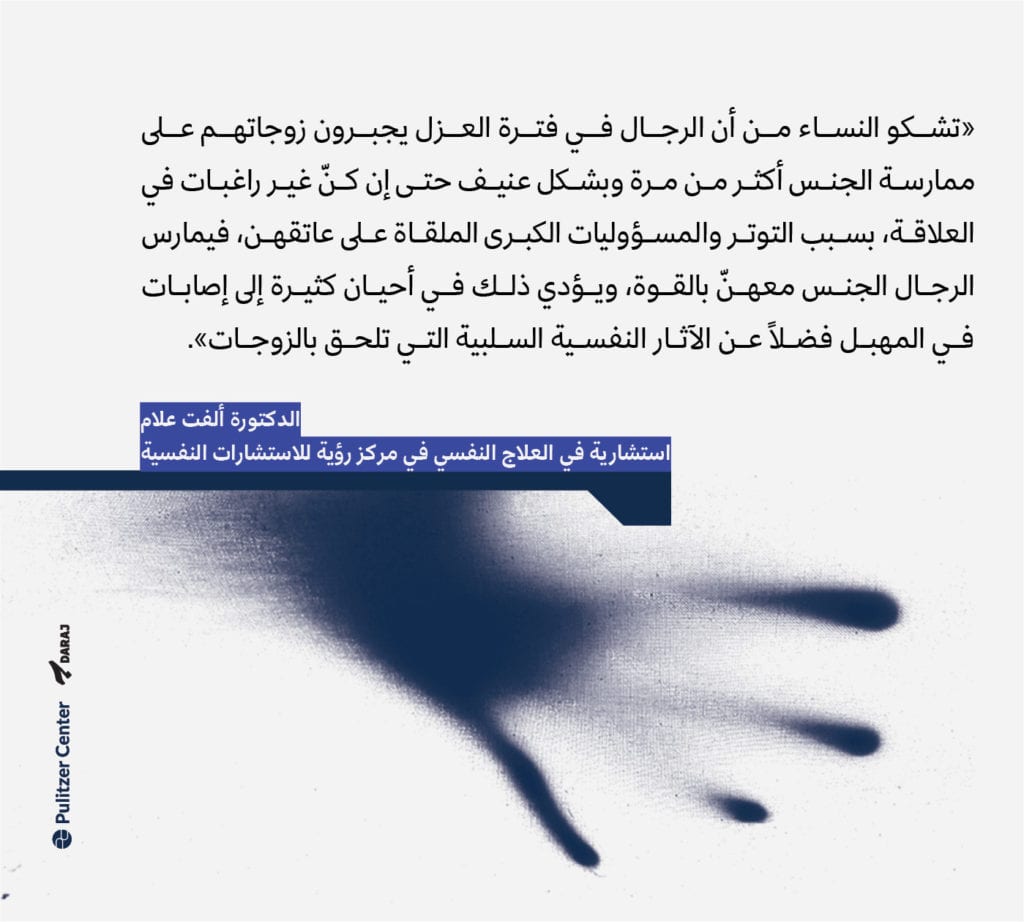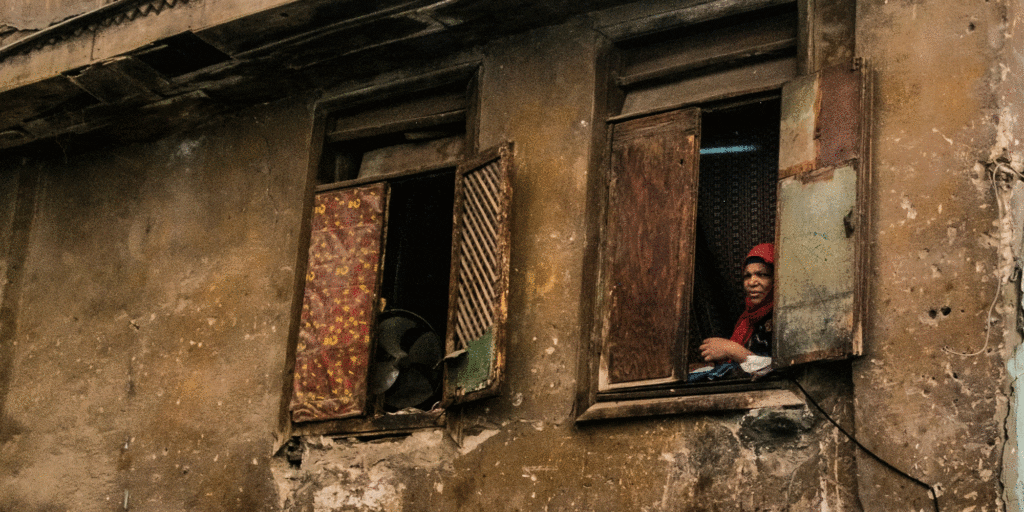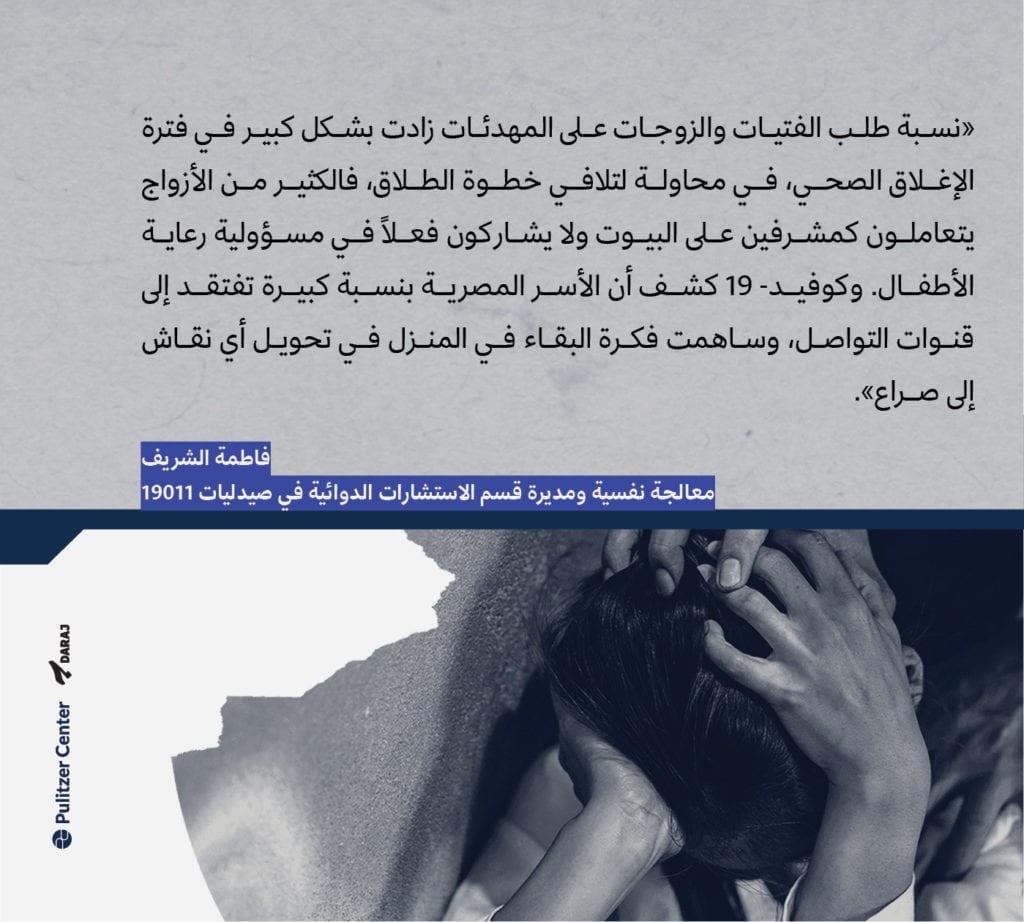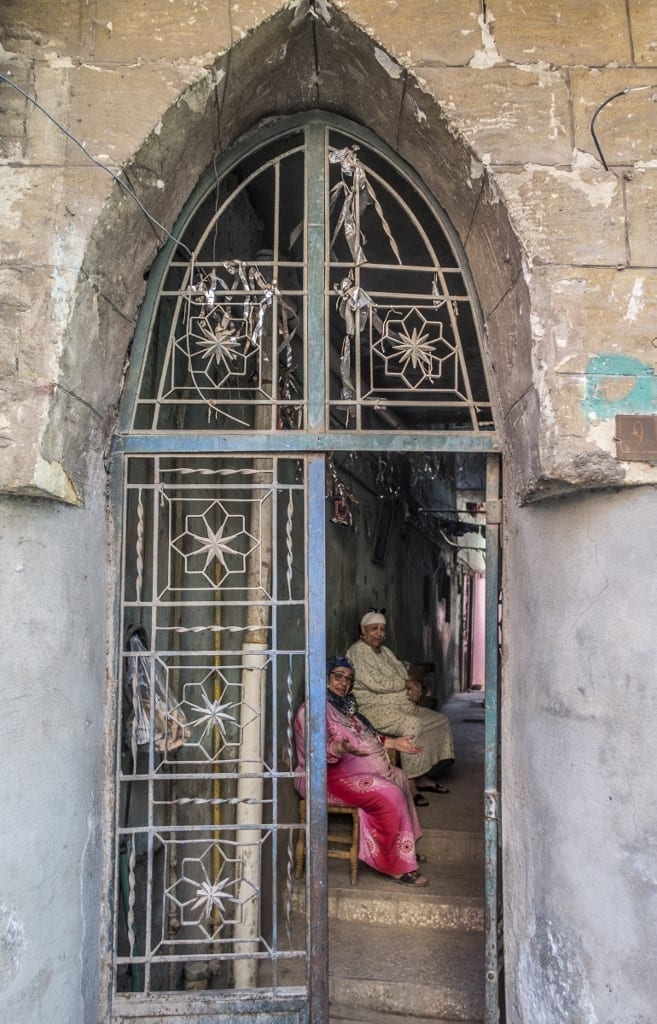This topic has been prepared in cooperation with Pulitzer Center.
“COVID- 19” has encircled the whole world for months, and the quarantine that has been imposed in Egypt, since March 2020, contributed to the terribly worsening climate of violence against women, especially after the increase of economic burdens on the Egyptian families due to the pandemic.
The extent of the economic suffering faced by Egyptian families was one of the main reasons for the escalation of domestic violence against women. Also, the fact that the family members stayed at home for a long time, in the absence of communication channels, has contributed to the rise of violence rates against women to unprecedented levels, according to specialists. These levels have involved different forms of crime, including murder, incitement to commit suicide, and rape.

Dr. Yasmine Abu Al-Azm, a former resident physician in the Obstetrics and Gynecology Department at one of the local hospitals, states to Daraj that she has witnessed, due to her job, cases of apparent domestic violence that sometimes lead to the death of the female victim of violence. Additionally, some girls and women are increasingly attempting to commit suicide using a drug sold in the farming fertilizers stores (we prefer not to mention the name of the drug). It is worth mentioning that it is impossible to save the suicide after taking this kind of drug, as it is a quick fatal drug and accessible at stores at a low price and without supervision.
She added: “Many girls and women come to the hospital, often suffering from broken bones, face and body swelling, or vaginal bleeding resulting from marital rape or rape committed by the brother or father. Some survivors refuse to file a report against the perpetrator and only ask for treatment, pain killers, and a way to stop the bleeding.”
The pattern of the level of crimes committed against women in the time of “COVID- 19” is unimaginable. Local media has reported the incident of a husband throwing his wife from the fifth floor due to her infection with Coronavirus. Similarly, newspapers also reported the incident of the father who used the Coronavirus lie to trick his three daughters into undergoing FGM. The doctor went to the girls’ house after their father had told them that they would receive a vaccination against Coronavirus. However, they were injected with an anesthetic that knocked them out. When they regained consciousness, they were surprised to find their legs tied, and felt pain in their genitals. The girls thus told their mother, who is divorced from their father, about what happened, and she then notified the competent authorities about the incident.


Unprecedented Cases
Newspapers also widely circulated the incident of a man killing his wife in Giza because she refused to have sexual intercourse with him. In another incident, a man killed his wife because it took her so long to prepare dinner. These accelerating crimes open the door to discussion about the legal and legislative position that must be taken to protect women from violence, which COVID- 19 has revealed the scope of its escalation. This deems it necessary to find appropriate mechanisms for raising awareness to limit the spread of domestic violence crimes along with imposing legal controls.
Dr. Abu Al- Azm confirms that rates of violence against women have increased with the spread of “Covid-19,” but they are incalculable because many of the abused women avoid resorting to hospitals out of fear of being infected with the virus. She added that rape cases committed by fathers and brothers are unprecedented, “I have seen cases of pregnant girls at the end of their ninth month of pregnancy, impregnated by their brothers or fathers. Besides, those victims do not have marriage certificates, so we are forced to deliver the babies quickly because they come to the hospital at the last minute, and then vanish after leaving their babies in the hospital!”
Dr. Abu Al-Azm recounts one of the incidents, saying: “I remember a woman who died as a result of her husband’s violence. Her entire body was swollen that her features were distorted because she was fiercely beaten. I tried to save her by doing CPR for half an hour, but she passed away. She lost her life due to domestic violence. In other cases, being violently beaten is not the only condition causing death to the woman. But rather, the victim herself attempts to commit suicide to put an end to the violence she is being subjected to and the hell she’s living through.
She continues: “Every day, we receive two or three cases of suicide committed using a well-known drug sold in fertilizers stores, in addition to a high number of cases of jumping from the top of a building to commit suicide. This deadly pill is one of the most widely distributed pills on the market used by farmers to preserve grains. It is readily available in farmers’ houses. Anyone taking it does not realize how dangerous it is, it is fatal, and the only way to save the victim is to wait for her certain death.”


Fatima Al-Sharif, a Psychologist and Director of the Drug Consulting Department in 19011 Pharmacies (formerly Rushdi), helps abused women virtually through online groups for free in order to contain the burdens and negative psychological effects which the abused women faced at home. She said to Daraj: “Before COVID- 19, we were focusing on psychological support for children and adolescents, but after the lockdown, we decided to create five WhatsApp groups to support battered women. In the beginning, we used to provide psychological support to patients suffering from anxiety, obsessive-compulsive disorder (OCD), and bipolar depression, but after a while, we noticed a rise in the rates of complaints about verbal and physical domestic abuse, as well as violence against children during the lockdown period. This is mainly due to the absence of communication channels between both husband and wife and among the father, the mother, and their children.”
Al-Sharif has assisted a 1,000 battered women and girls so far. In addition, she receives more than five weekly complaints of domestic physical violence against wives and more than 70 weekly cases of verbal abuse.
“The percentage of girls and wives who use tranquilizers has increased dramatically during the quarantine period,” she points out, “attempting to avoid divorce. Many husbands consider themselves ‘supervisors’ over their families and do not really take part in child care. Covid-19 revealed that Egyptian household largely lacks communication channels, and the idea of staying at home contributed to turning any discussion into a conflict.”
Dr. Olfat Allam, a consultant psychotherapist, at Roaya center for Psychological Consultations, noticed a significant increase in cases of domestic violence, especially against women and children. “We receive at the center’s clinics cases of physical violence, especially sexual violence,” she said, “on average, three cases of sexual violence per week. Women complain that during the period of home quarantine, men force their wives to have sex more than once, and violently, even if they do not feel like it, due to the stress and the responsibilities they are carrying. Men have sex with them by force, often resulting in vaginal injuries and negative psychological effects on wives.”
“Those who previously attempted suicide,” added Allam, “have a stronger urge to try again during the quarantine. Many in the treatment sessions have said it is time for them to die. And some of those who did not attempt suicide before, and were exposed to severe violence during home quarantine, showed suicidal tendencies, though in a lower percentage than those who had a previous history of attempted suicide.”
“We receive many cases every day at Roaya Center from towns outside Cairo,” says Allam. “We receive women from Minya, Mansoura, Damietta, Banha and Delta governorates every day. But women from far places cannot reach us due to the long distance, so we provided online support for survivors of sexual violence.”


We have contacted the National Council for Women in an attempt to reach the latest figures on the number of female victims of violence in Egypt from March to July 2020, but we have been told that the Council works under the Presidency and can only offer information through an official statement approved by the Presidency. So far, there has been no official statement about the phenomenon of domestic violence during the time of “COVID-19”. But a study published last year by the Central Agency for Public Mobilization and Statistics in cooperation with the National Council for Women revealed that 1.5% of Egyptian women are exposed to domestic violence, which is a doubtful figure, according to other monitoring data issued by international organizations and human rights organizations.
Mai Mustafa, from Tadwein Gender Research and Training Center, said she noticed an increase in the number of domestic violence complaints. “We are trying to refer survivors to specialized psychological support centers or legal rights centers to make survivors aware of the need for legal action to punish the offender, who is often the husband or father,” said Mai. As for the attempts to count the number of violence victims during the period of quarantine from March until now, she added, “The numbers are too large, but unfortunately we have not yet done a specific census. We are playing research and intermediary role to ensure that the survivor communicates with legal and psychological support as much as possible.”
Commenting on last year’s statement of the National Council for Women, which stated that the percentage of female victims of domestic violence in Egypt was 1.5 percent, Mostafa laughed and said: “Of course not, in Egypt there is more domestic violence than expected.”
Edraak Psychiatric Foundation is working on counting the number of female victims of violence in Egypt during the outbreak of COVID-19, a statistic expected to be issued according to a detailed study soon. Dr. Nagwa Ramadan, from Edraak, says, “We have established an observatory of all the types of violence that took place during the outbreak of Covid-19, January to June 2020, this is our first step in monitoring the rates of violence against women in all its forms. We will extend the monitoring service until the year 2021 and rely on more than one source for monitoring.”
“What happened recently was an increase in the rates of violence,” Ramadan adds, “We, thus, created this observatory, as we noticed a surge and mutations in crimes against women, including crimes we didn’t know before. We are therefore providing health education and awareness to women, and as for psychological and legal support we send survivors to other fellow institutions”.
Economic Burdens Incite Violence
By returning to the pressing economic burdens that Egyptian families are experiencing, which contribute to fueling the domestic violence of all kinds, a graph, annexed to a study published by the Central Agency for Public Mobilization and Statistics in April 2020, revealed the scale of the economic suffering that has been suffocating Egyptian families in the shadow of the “Covid-19” crisis.
According to the study, more than 92 percent of the population decided to rely on cheaper food, 89.8 percent decided to reduce weekly consumption of meat, birds and fish. 37 percent of households saw a fall in income as a result of the crisis, 36 percent of which was to reduce the amount of food consumed. 25.8 percent of families borrowed to buy food, and 14 percent to reduce adult consumption of food to be able to feed children. 4.6 percent of families decided to send family members to eat elsewhere, 19.8 percent of families decided to reduce the number of meals, 28.2 percent to buy food on credit, in addition to one family member losing his job, as a large number of private enterprises laid off workers.






